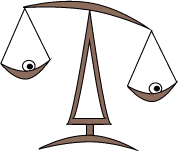Blind Justice
Created | Updated Aug 19, 2004

The Law's Ass
Ever wondered what life in the law is really like? Ever thought you would get the
opportunity of reading something written by a lawyer without being charged?
This was something that was clearly on display recently when artist Banksy decided to depict the
historic figure of Justice in thigh-high boots and suspenders. For the full story go here.
It shouldn't be allowed
Or should it? Let's just look at why someone would produce something as deliberately
provocative as this statue. If you read the BBC piece you will see that the artist is making a
satirical statement again an erroneous conviction and a general statement in opposition to a legal
system that he considers to be corrupt.
I say, GREAT! Why shouldn't an individual be free to make this sort of statement. We are told
that we live in a democracy and that we have many freedoms which we exercise daily. The reality is
that live in a legal system of residual rights. You can only do what it is lawful to do after the
legislature have taken away what they don't want you to do.
One of the greatest freedoms, however, that has not been taken away (and is even now enshrined
in the law itself) is freedom of expression. I applaud anyone who uses this non-violent method of
making any point they want.
The Paradox Issue
The problem that people like Banksy have is that their first general premise is flawed. They
work from the assumption that, amongst other things, the law is corrupt, flawed and unsound. Here
I have to disagree.
As an immediate example I would recommend looking at the Legal System of, say, Chile in the
early 1970's or the Soviet Union during the Cold War. These so-called judicial systems removed,
by force artists, authors, poets and many other people simply because their ideology did not match
with that of the government at the time. No trial. No appeal. These people just disappeared and
often were murdered by the state.
I am pleased and relieved (as, no doubt is everyone else) that these practices are not nor have
they ever been carried out in the United Kingdom.
The Paradox is, therefore, that we actually, in law, protect the right of the individual to make
statements like Banksy's sculpture of Justice. We protect the right of the individual to disagree
with the government and the legal system. It is ironic as well as a paradox that satire is called upon
the very principle that protects the satirist
The Sweeping Statements
Let me quote Voltaire,
'I do not agree with what you have to say, but I'll defend to the death your
right to say it.
It's all well and good saying that someone was wrongfully imprisoned and complaining about the
judicial system but consider these points
- What has the complainer ever done to correct the 'miscarriage'.
- That is why we have an appeals system.
- Better to wrongfully imprison an innocent man than hang him.
- Those wrongfully imprisoned are compensated.
Now I appreciate that seems a bit blunt and that people who are wrongfully imprisoned lose chunks
of the lives but I phrase it in this way simply to make clear that there are checks and balances
within our system to protect anyone accused of a crime. Perhaps the greatest of these is
'Innocent Until Proven Guilty'. The burden of proof falls on the prosecution to
prove beyond reasonable doubt that the accused did it.
If you think this is a universal truth, look at France where it's 'Guilty Until Proven
Innocent'
As for corruption and the like - let's be a bit more specific shall we. Sweeping statements like
that don't help anyone. If you've got a case make or, quite frankly, belt up. I accept there is no
direct suggestion of this in Banksy's statement but I can't help feeling that the odour of it is
there.
Where do we go from here?
The question is, of course, 'What do you want?' Everyone must have freedoms and rights but
they must be policed. That means laws and that means lawyers and judges.
I think people forget that lawyers and judges are human and subject to the same temptations,
emotions and other symptoms of the Human Condition. It's just that, on most occasions they're
better at putting it to one side than most other people.
If you want draconian justice, live in a totalitarian state. If you want to have your rights and
express them then choose a democracy. Just remember that Democracy comes at a price. The
price is that occasionally, mistakes are made and that those freedoms are to some lesser degree
controlled.
My thanks go to Caractacus for pointing out the news item
upon which this article is based.
